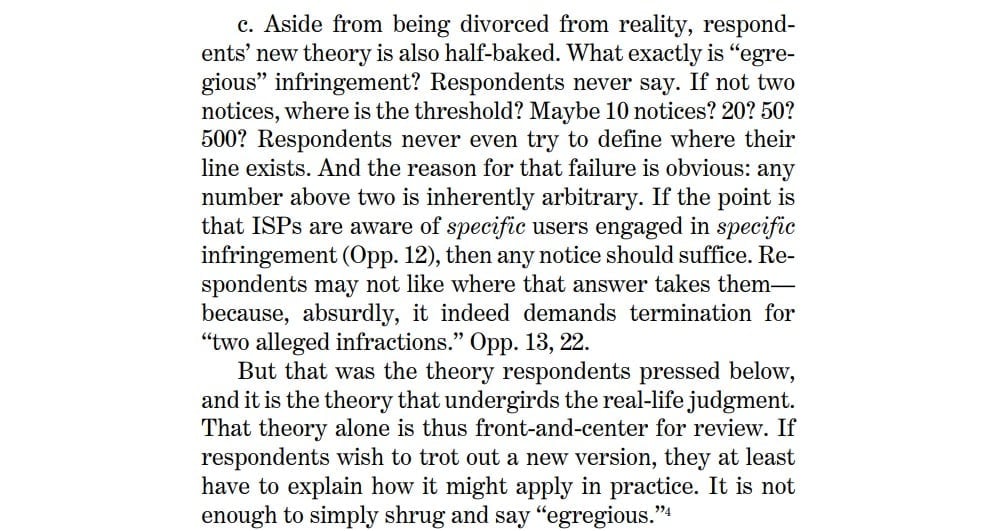In late 2022, music industry giants including Warner Bros. and Sony Music secured a victory in their lawsuit against Internet provider Grande Communications.
The record labels had accused the Astound-owned ISP of failing to adequately address its subscribers’ copyright infringement, specifically by not terminating repeat offenders.
This resulted in a Texas federal jury finding Grande liable for willful contributory copyright infringement and $47 million in damages.
While the Fifth Circuit Court of Appeals later upheld the infringement verdict, the lower court’s decision on how damages should be calculated was overturned, meaning a new trial is needed to determine the final amount. Meanwhile, Grande continues to contest the core liability ruling.
Grande Petitions Supreme Court
In March 2025, Grande took its fight to the Supreme Court. The ISP petitioned for intervention, arguing that existing law offers no clear guidance for providers on how to handle copyright infringement notices or when to terminate subscriber accounts. Grande’s petition specifically asked the Supreme Court to address two key questions:
“Whether an ISP is liable for contributory copyright infringement by (i) providing content-neutral internet access to the general public and (ii) failing to terminate that access after receiving two third-party notices alleging someone at a customer’s IP address has infringed.”
Grande’s petition is similar to one filed by Cox Communications last year, but it’s more tightly focused on the termination threshold. Specifically, it requests clarity on how ISPs are to respond when they receive more than one third-party allegation of copyright infringement.
Record Labels Highlight “Egregious” Infringement
Where Grande is distilling the matter to its basics, the music companies responded by pointing out that the ISP has a “never terminate” policy. The question of how ISPs should respond to two third-party copyright infringement notices is a mere “hypothetical,” they countered.
“Grande refused to terminate service under any circumstance, even after receiving thousands (or tens of thousands) of credible infringement notices about a single customer,” the music companies responded at the Supreme Court.
The rightsholders stress that Grande was well aware of the fact that many of its subscribers were engaged in “egregious” copyright infringement. Instead of taking action to stop this activity, the ISP allegedly did nothing. Therefore, the music companies asked the Supreme Court to deny the petition.
Grande: What Does Egregious Even Mean?
Before the Supreme Court decides whether to take on the case, Grande took the opportunity to have the last word. The ISP vehemently disagrees with the record labels, arguing that they’re trying to dodge a Supreme Court review by mischaracterizing the central legal question and the factual record.
Grande argued that the core issue is, and always has been, whether an ISP can be held liable for contributory copyright infringement simply for providing internet access to subscribers who are merely known (i.e., received two or more infringement notices), rather than proven “egregious,” infringers.
They accuse the music companies of inventing the “egregious infringement” standard that was never part of the case, to make their victory seem less controversial. According to Grande, the judgment against it was based on the broader, lower threshold of two or more notices.
“Respondents have no basis for contesting the obvious certworthiness of this question. So they instead try to dodge review by blatantly rewriting the record,” Grande notes, adding that the appeal court “did not say anything about ‘egregious’ infringement because respondents’ case was not limited to egregious infringement.”
Maybe 10 notices? 20? 50? 500?
The Internet provider stresses that current copyright law isn’t clear on the threshold for repeat infringement. This was simply not defined by Congress in the DMCA and, after being a non-issue for years, has now resulted in multiple lawsuits with billions of dollars on the line.
The music companies’ argument citing “egregious” infringement is not what this case boils down to, the ISP notes, as providers have been held liable for subscribers that allegedly infringed twice. Grande adds that it isn’t even clear what “egregious” means.
“Aside from being divorced from reality, respondents’ new theory is also half-baked. What exactly is ‘egregious’ infringement? Respondents never say. If not two notices, where is the threshold? Maybe 10 notices? 20? 50? 500?” Grande writes.
“Respondents never even try to define where their line exists. And the reason for that failure is obvious: any number above two is inherently arbitrary. If the point is that ISPs are aware of specific users engaged in specific infringement, then any notice should suffice.”

In addition to disputing the number of infringements that qualify for liability, the ISP also highlights the Supreme Court’s recent analysis of secondary liability in Twitter v. Taamneh, suggesting that providers may not be secondarily liable for subscribers at all.
Cox and the U.S. Amicus Brief
Grande has made many of these arguments before, but it now sees itself strengthened by an amicus brief the U.S. Solicitor General sent to the Supreme Court, encouraging it to take on the related Cox petition. That case also revolves around liability, with music companies taking on the ISP.
The U.S. opinion referenced the aforementioned Taamneh ruling, questioned ISP liability, and warned that the current precedent may lead to disconnections for many innocent subscribers. While Grande’s petition has different nuances, the company says that it would serve as an “ideal companion” case.
“The government has confirmed that Cox should be granted — as it plainly should. This case remains an ideal companion to Cox. It presents the purest form of the question on the cleanest record,” the ISP writes.
With all arguments now on the table, the decision rests with the Supreme Court. The Justices will decide whether to grant Grande’s petition, a move that could have profound implications for the entire ISP industry and its role in battling online piracy.
—
A copy of Grande’s reply brief, which was submitted to the Supreme Court a few days ago, is available here (pdf).
From: TF, for the latest news on copyright battles, piracy and more.
Source : Grande Slams Labels’ “Egregious” Piracy Claims in Final Supreme Court Plea










